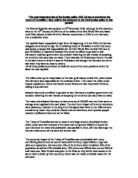Unification of Italy
How valid is the view that, "in the period 1796-1870 the most serious barrier to political change in Italy was widespread apathy among the people?
In 1871 Italy became a unified nation, however in the period of 1796-1870 there were many barriers, which prevented the political change in Italy. The widespread apathy of the people certainly did effect the unification of Italy, however there were other barriers such as the foreign influences of Austria, the un-organisation of the revolts and the fact that at the beginning the Risorgimento was more for the elitist class. So it is not valid to say that apathy was the most serious barrier as there were other factors that together made it difficult for Italy to become united.
One factor that was particularly influential was the power Austria has over Italy. Austria was a major power at this time with a large empire. During this period there were a number of revolutions across Europe. Austria and Russia were both conservative monarchists that were determined to suppress any nationalistic movements as possible as they were worried about the spread of revolutions affecting their own countries.
How valid is the view that, "in the period 1796-1870 the most serious barrier to political change in Italy was widespread apathy among the people?
In 1871 Italy became a unified nation, however in the period of 1796-1870 there were many barriers, which prevented the political change in Italy. The widespread apathy of the people certainly did effect the unification of Italy, however there were other barriers such as the foreign influences of Austria, the un-organisation of the revolts and the fact that at the beginning the Risorgimento was more for the elitist class. So it is not valid to say that apathy was the most serious barrier as there were other factors that together made it difficult for Italy to become united.
One factor that was particularly influential was the power Austria has over Italy. Austria was a major power at this time with a large empire. During this period there were a number of revolutions across Europe. Austria and Russia were both conservative monarchists that were determined to suppress any nationalistic movements as possible as they were worried about the spread of revolutions affecting their own countries.







